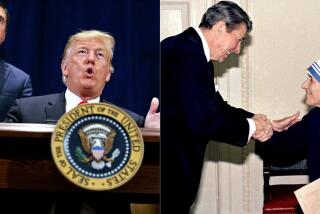Summit’s Success May Boost Reagan Political Stock on Arms Control
- Share via
WASHINGTON — The “fireside summit” in Geneva appears to have strengthened President Reagan’s hand at home in the continuing debate over arms control, an issue on which he has usually found himself on the defensive.
In particular, Reagan may be able to turn his accomplishments in Geneva to his advantage in the growing controversy over his Strategic Defensive Initiative, the space-based anti-missile system widely known as “Star Wars.”
Although the substantive accomplishments of the summit meeting are modest, Reagan’s performance in Geneva contrasted favorably with the profile etched of him by his political opponents as ill-suited to the demands of nuclear statesmanship.
‘Batted .110 at Geneva’
“He batted only about .110 at Geneva,” said Democratic pollster Harrison Hickman. “But we always said he could never do better than zero.”
And analysts of all political persuasions said that Reagan could convert his face-off with Soviet leader Mikhail S. Gorbachev into at least near-term political benefits.
Rep. Edward J. Markey (D-Mass.), one of Reagan’s most persistent arms control critics, conceded that “the President will bask in post-summit public approval and Congress will probably not be willing to buck him” on such issues as “Star Wars.”
Among Reagan’s supporters, Burton Pines, vice president of the Heritage Foundation, a right-wing Washington think tank, said: “The summit has created tremendous problems for the President’s critics. Reagan demonstrated he was fully capable of sitting down and dealing with Gorbachev.”
Overly High Expectations
Some Democrats predict that Reagan’s post-summit glow will fade before long, in part because his first meeting with Gorbachev has created unrealistically high expectations for future progress on arms control.
And Markey believes that the scheduling of two more summits in 1986 and 1987 will invite “much closer scrutiny” by Congress of the Strategic Defense Initiative, which appears to be more firmly established as a central element of Reagan’s approach to arms control now that he has refused to yield to Gorbachev’s demand that he abandon it.
Markey argued that Reagan will eventually have difficulty seeking legislative support for the program to develop space-based defenses against missiles unless he is willing to change his position and bargain about it with the Soviets.
For now, though, the hero’s welcome that Reagan received from a joint session of Congress on his return from Geneva Thursday night will help ward off the lame-duck doldrums that inevitably threaten to overtake any second-term President.
Among the program’s opponents, John Isaacs, legislative director of the Council for a Livable World, an arms control lobbying group, conceded, “As negotiations on arms control continue and plans proceed for the next summit, we’re going to be hurt in trying to fight ‘Star Wars.’ ”
And Chris Payne, an aide to Markey, said, “The escalating expectations for arms control will provide Congress with some justification for supporting ‘Star Wars.’ ”
Wide Appeal Claimed
Reagan loyalists contend that critics of “Star Wars” do not appreciate the proposal’s basic appeal to the public. The Soviets’ vigorous objection to a space-based U.S. anti-missile system is actually a positive factor for the plan at home, according to Reagan pollster Richard Wirthlin.
Richard V. Allen, Reagan’s former national security adviser and now an international trade consultant, argues that the defensive system has a natural appeal to a basic American character trait.
“DE-fense, DE-fense--it’s what people chant at football stadiums every Saturday and Sunday,” Allen said. “Defense is a popular idea with the American people. We don’t want to get involved with foreign countries.”
However, even the President’s close advisers doubt that the benefits he derived from the summit will extend to domestic issues.
“I’m inclined to think that it’s not going to be much of a transferable skill,” the White House chief of staff, Donald T. Regan, said. He predicted that the outcome of battles over budget and farm policy will not be influenced by what happened in Geneva.
However, Regan said that the President’s summit performance could help him in such areas as foreign aid and defense spending. And if nothing else, Reagan’s newly demonstrated skill at summitry gives him a positive point to stress while frustrations pile up on the domestic policy front.
Timing Proved Lucky
Even fate appeared to have a hand in Reagan’s success at Geneva. During his first term, while the President was determined to build up the U.S. defense establishment and to describe the Soviet Union in harsh terms, the three Kremlin leaders--Leonid I. Brezhnev, Yuri V. Andropov and Konstantin U. Chernenko--seemed ill-suited because of age and health to play the role of summit partner.
By the time that Reagan’s second term got under way and the President had clearly departed from the “softer” policies of his predecessors toward the Soviet Union, it was Reagan’s good fortune that the new Soviet leader was Gorbachev, a vigorous, outgoing personality who perceived a summit meeting as consistent with his own and his country’s interests.
The President and his advisers were not willing to let their summit prospects rest on good luck alone, however. To exploit the opportunity to the fullest, they worked hard beforehand to reduce public expectations of what could be accomplished.
“The White House did the smart thing,” said Democratic pollster Hickman. “They created the lowest possible expectations, and they managed to get something that was slightly better than the lowest possible expectations.
“And now this helps Ronald Reagan’s image as someone who has made a start at having a serious dialogue with the Russians.”
More to Read
Get the L.A. Times Politics newsletter
Deeply reported insights into legislation, politics and policy from Sacramento, Washington and beyond. In your inbox twice per week.
You may occasionally receive promotional content from the Los Angeles Times.










